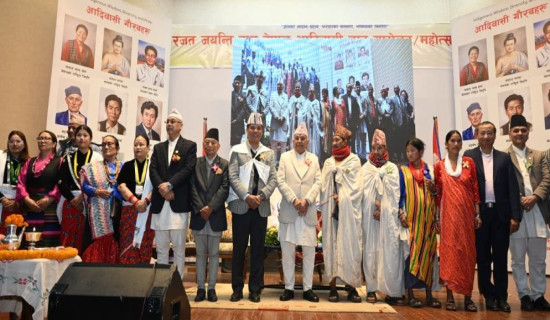- Monday, 9 February 2026
Expert meet ends, stresses climate cooperation
Kathmandu, May 25: With a message that healthy mountains are crucial for a healthy climate, the two-day International Expert Dialogues on Mountains, People and Climate concluded here on Thursday.
Other messages of the jamboree include that mountain and coastal ecosystems are highly vulnerable to climate change and supporting lives and livelihoods in both upstream and downstream regions is crucial.
Presenting the key takeaways, Dr. Maheshwor Dhakal, Joint Secretary at the Ministry of Forest and
Environment, said that the mountain regions, often contributing least to climate change, face disproportionate impacts.
The dialogue emphasised the need for climate justice and locally-led solutions. Collective action and
political will are essential for sustainable solutions to the mountain agenda, he said.
Urgency for action
According to Dr. Dhakal, 1.5 degrees Celsius of warming is too high for mountain ecosystems. Mountains are crucial for global water, food supply and biodiversity, and climate change has threatened all these, he said.
The dialogue highlighted the need for urgent global leadership to limit warming to 1.5 degrees Celsius. Participants at the dialogue called for leveraging existing knowledge platforms, regional partnerships, and global cooperation. They stressed the importance of including gender equality, and social, and disability inclusion in climate action.
Scientific evidence shows that human activities are leading to greenhouse gas emissions, glacier declines, and socio-economic impacts, they said, adding that rapid warming, shifting monsoon patterns, glacier melting and increasing disasters are expected between 2030 to 2050. Strengthening observational knowledge gaps and understanding mountain dynamics, such as glacier ice volumes and snow cover variation, is crucial, Dr. Dhakal said.
Emerging threats
“The Himalayas face complex climate change impacts. Addressing these requires improved methodologies for assessing non-environmental loss and damage, including livelihood, health, and ecosystem services. Effective utilisation of climate finance for loss and damage is essential,” participants from various countries and non-governmental organisation representatives said.
Dr. Dhakal further said there are immense opportunities to convert mountains into regions of opportunity by nurturing diversity and human adaptability. Long-term, proactive solutions are needed for building resilience, he added.
Community partnerships between mountains and lowlands are vital. Approaches like community-based forest management, climate-resilient tourism plans and transboundary collaborations require people-centric policies, he said.
Locally led adaptation
Local communities on the frontlines of climate change need a greater voice in decision-making. Shifting from top-down approaches to empowering local actors is crucial for effective adaptation, the participants said. Recognising the role of local institutions, building capacity, and increasing direct access to climate financing are prerequisites for sustainable local solutions, Dr. Dhakal said.
There is a significant gap in international climate finance reaching local levels. He said revising current policies to target vulnerable groups, including women and youth, is urgent.
Another key message from the dialogue is rapid decarbonisation of energy systems is needed. Investments in the green economy should focus on social equity and justice. Clean electricity and nature-based solutions are key paths to decarbonisation.
Mountainous countries face high costs and are often heavily indebted. Climate finance must be provided in grants-based and concessional terms. Simplifying access to international climate finance is crucial.
Speaking at the conclusion session, Minister for Forest and Environment Nawal Kishwor Sah Sudi said that Nepal is committed to tackling all the critical agendas discussed during the session. “We firmly believe that our mission’s success depends on the collaboration on solidarity among mountain nations,” he said. Together with committed nations like Bhutan and Bangladesh, Nepal aspires to be a pivotal player in this significant moment, as these countries share common goals, he added.
The event was organised in response to the Prime Minister of Nepal's pledge during COP 28 to raise awareness about climate change and advance the mountain agenda in UNFCCC negotiations.
Over 250 delegates from around the world, including representatives from Nepal, gathered at the event stressed the need for prioritising mountain-based actions in the context of climate change. The participants urged mountain countries and agencies to collaborate with UNFCCC mountain work programmes and mandates.








-square-thumb.jpg)








